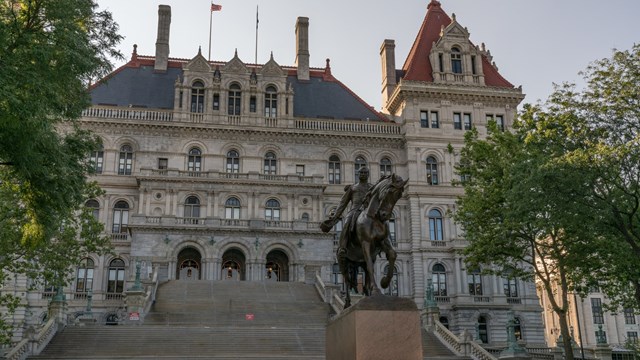Yet another new law has recently passed that affects co-ops, condo and HOA boards, as well as residents who lease their units. The law addresses the potential for flooding of leased residential premises due to historic rainfall and natural disasters such as hurricanes. As enacted, it requires compliance by all landlords - including co-op, condo and HOA boards that lease homes as a landlord, as well as co-op shareholders and condo/HOA unit owners who rent their units.
What the Law Says
Effective immediately, New York State Real Property Law Section 231-B now requires that all residential leases (including proprietary leases, subleases, and all other types of leases) provide notice to the shareholder/lessee/tenant regarding the leased premises’ previous flood history and current flood risk. To be clear; the law applies to floods from natural events such as heavy rainfall, coastal storm surges, tidal inundation, or river overflows - not to flooding from a broken pipe, bathroom leak, etc. As such, any reference to a “flood” in this memo means floods resulting from rainfalls and storms.
Under the new law, the notice must explain any damage that resulted from a flood and whether the leased premises is located within a Federal Emergency Management Agency (FEMA) floodplain, a Special Flood Hazard Area, and/or a Moderate Risk Flood Hazard Area. In order to ascertain if the leased premises fall within one of these categories, you must consult FEMA’s current Flood Insurance Rate Maps. This new law requires transparency from the Co-op/Landlord to the shareholder/tenant about the history of floods and potential risk of floods for a leased premises.
Additionally, this new flooding law requires a notice/warning to shareholders/tenants about the availability of flood insurance and the limitations of certain ordinary policies. Specifically, all residential leases must contain the following language: “Flood insurance is available to renters through the Federal Emergency Management Agency's (FEMA's) National Flood Insurance Program (NFIP) to cover your personal property and contents in the event of a flood. A standard renter’s insurance policy does not typically cover flood damage. You are encouraged to examine your policy to determine whether you are covered."
This new law was adopted because recent storms such as Hurricanes Ida and Henri created substantial damage to thousands of residential apartments. The New York Legislature reasoned that “Robust flood disclosure is a necessary tool for protecting New Yorkers on the frontline of climate change. Vulnerable communities have repeatedly expressed concerns regarding the growing costs of flood damage in their homes, but renters from low-income communities experiencing repeated flood events are often never warned about the risks they face when moving into a new home. Flood disclosure meets the fundamental goal of providing awareness and transparency for all residents, irrespective of income. Studies have shown that knowing the level of one's risk helps change patterns of behavior related to flood insurance, increasing uptake of up to 15 percent or more.”
Despite the legislative rationale for the law, we believe it was not intended to cover co-ops, which are a unique type of housing. In that regard, I have been working with a legislator to introduce a bill that would exclude co-ops from the impact of any future legislation like this, and make changes to New York Real Property Law so that essentially co-ops will not be affected or required to comply with future such laws, unless a proposed new law specifically states it would apply to co-ops. However, since that bill has not yet passed, and since Section 231-B does not currently include a carve-out for co-ops, co-ops must comply with the law as it applies to all leases - including Proprietary Leases.
The entirety of this new law codified as Section 231-B of the New York State Real Property Law is as follows:
1. Every residential lease shall provide notice of the following information related to the previous flood history and current flood risk of the leased premises, as follows:
(a) whether any or all of the leased premises is located wholly or partially in a Federal Emergency Management Agency ("FEMA") designated floodplain;
(b) whether any or all of the leased premises is located wholly or partially in the Special Flood Hazard Area ("SFHA" "100-year floodplain") according to FEMA's current Flood Insurance Rate Maps for the leased premises' area.
(c) whether any or all of the leased premises is located wholly or partially in a Moderate Risk Flood Hazard Area ("500-year floodplain") according to FEMA's current Flood Insurance Rate Maps for the leased premises' area; and
(d) any prior flood damage to the leased premises due to a natural flood event, such as heavy rainfall, coastal storm surge, tidal inundation, or river overflow, that the lessor knows or reasonably should know has occurred to such premises and the nature of any such damage.
2. Every residential lease shall also contain the following notice to tenants: "Flood insurance is available to renters through the Federal Emergency Management Agency's (FEMA's) National Flood Insurance Program (NFIP) to cover your personal property and contents in the event of a flood. A standard renter’s insurance policy does not typically cover flood damage. You are encouraged to examine your policy to determine whether you are covered."
Getting Compliant
To ensure compliance with this new statute, we recommend the following steps to be taken by each Board and/or Managing Agent:
First, a thorough review of the flood history of each apartment/unit within the co-op should be conducted. Next, FEMA’s current Flood Insurance Rate Maps should be analyzed based on the co-op’s address (the link is provided above, but we can assist you if you require further guidance).
Finally, the best way to implement these informational requirements as well as the flood insurance notice is to draft a Notice to be included with all future Proprietary Leases and other leases. The Notice can be incorporated directly into your Proprietary Lease, so you do not have to have another document signed at each closing. A sample Notice form can be found here.
Additionally, if your co-op permits subleasing, we recommend that a new house rule be created that requires this notice on all subleases (your co-op’s legal counsel can prepare the House Rule amendment for you).
Note, it can be argued that by adding the new flood notice language to the standard Proprietary Leases, you are amending the lease (which usually requires a vote of the shareholders to accomplish legally). However, it is our opinion that this new statute is purely a “notice” statute. In addition, this is not optional so failure to include it would be a violation of the law. Therefore, in our opinion, including the notice on the last page of new leases so as to give the requisite notice required by the statute would not be considered an “amendment” to the lease within the context of what would require a vote of the shareholders (in a co-op). In fact, this is very similar to the requirement to include certain information on fire sprinklers which was similarly required to be included in the leases several years ago.
Please be advised that the new law does not include any penalties for noncompliance, nor any enforcement mechanisms. However, it is possible that a failure to provide the notice in the proprietary lease, occupancy agreement, lease or sublease may open the door to a court determining the lease is void; although we believe this is unlikely. It is possible that in the future, this law will be modified so as to not require co-ops to comply with this statute. Until such time, it is imperative that the law be followed.
Marc Schneider is a partner with New York City-based law firm Schneider Buchel, LLP.










Comments
Leave a Comment